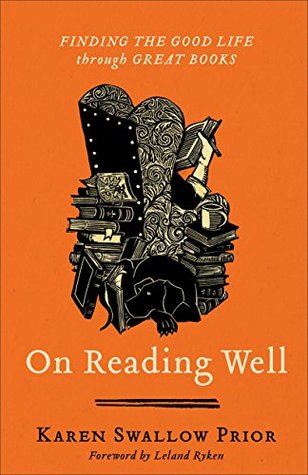More on this book
Community
Kindle Notes & Highlights
Started reading
November 28, 2022
foreword I have set myself the task of previewing the three things that readers most need to know as they begin to read the book that follows. These three things touch upon the context, the content, and the achievement of the book.
Worse yet, “speed-reading gives you two things that should never mix: superficial knowledge and overconfidence.”
In other words, plot reveals character. And the act of judging the character of a character shapes the reader’s own character.
theological virtues—faith, hope, and love—are drawn directly from the Bible.
unlike the other virtues, they occur in their true sense not through human nature but by God’s divine power. As we will explore in part 2, the sense of faith, hope,
These heavenly virtues are charity and temperance (discussed in previous sections of the book), chastity, diligence, patience, kindness, and humility. Traditionally, the heavenly
specifically countered the seven deadly sins (a list that has also varied throughout church history).
In its original sense, apocalypse means “revelation.”
The word later came to be associated with an end-of-the-world cataclysmic event because of the link John’s Revelation in the Bible makes between revelation and the end of this world.
In a religiously based apocalypse, “the suffering and pain we encounter in this life gains meaning” and “hope is restored.”
Modern apocalyptic literature, which is largely secular apocalyptic literature, demonstrates the truth about the modern condition: because we have replaced God with ourselves as the source of meaning and the center of the universe, “all we see on the horizon is our end.”
The four conditions of hope are that it regards something good in the future that is difficult but possible to obtain.
The practice of hope, Aquinas says, is “a certain stretching out of the appetite towards good.”
Second, the word stretch (notice its bodily meaning) implies a degree of discipline and sacrifice that is missing when hope is used synonymously with a word like wish. To wish is not to hope. A wish is not a virtue. Hope is.
first sort of hope is one common to all human experience. It’s a sense of anticipation for a future outcome:
Theological hope “is a steadfast turning toward the true fulfillment of man’s nature, that is, toward good, only when it has its source in the reality of grace in man and is directed toward supernatural happiness in God.”15
There are two kinds of hopelessness: presumption and despair. Presumption (or false hope) assumes that one’s hope will be fulfilled; despair anticipates that one’s hope will never be fulfilled. Both presumption and despair “are in conflict with the truth of reality.”21 Both “destroy the pilgrim character of human existence.”
Choosing hope—whether amid the annihilation of the world or merely a political breakdown—is virtuous.
But in so far as hope regards one through whom something becomes possible to us, love is caused by hope, and not vice versa.
Hope is “a desire for something good in the future,” as well as “the thing in the future that we desire” and “the basis or reason for thinking that our desire may indeed be fulfilled.”
Watchfulness counters both despair and sloth, which is the “beginning and root of despair” and inhibits “courage for the great things.”52 Sloth is considered a capital sin because it prevents a person from becoming what God wants her to be and who she truly is.53
The “supremacy of the detail over the general, of the part that is more alive than the whole,” is the basis, Nabokov says, for the “irrational” belief, against all contrary facts, in the goodness of man.62 And the “capacity to wonder at trifles—no matter the imminent peril,” Nabokov explains, is how “we know the world to be good.”
Secular Age, Charles Taylor describes three senses of transcendence, three ways of reaching beyond the flatness of the here and now: through belief in God or some higher power, through the extension of natural or mortal life, and through agape love.85 Clearly, the man in The Road achieves at least this last kind of transcendence.
secularity, according to Taylor, is that human flourishing becomes the highest good.86 Although a pilgrimage—whether literal religious travel or metaphorical spiritual journey—involves both linearity and change, it differs subtly but significantly from the modern idea of progress, the foundation for the secular notion of human flourishing. Postapocalyptic stories confront the myth of progress. Progress is not the same as hope. The modern idea of progress is founded on a belief in the perfectibility—or at least the unbounded improvability—of humankind. Progress is an Enlightenment idea,
...more
the myth of progress cannot account for evil.88 Hope, however, takes evil into account. The “fundamental structures of hope” are built upon belief in the goodness of creation, the nature of evil, and the plan of redemption.89 Nowhere is evil more obvious than in suffering.
Yet the doctrine of progress in the modern age does not make room for suffering. Rather, the notion of progress suggests “that the great evils heretofore experienced in history are passing phenomena, not enduring characteristics of human existence.”90 The entire project of progress, as noble as it is untenable, is to eliminate suffering. The Road demonstrates the impossibility of such an idea. Yet, in so doing, it demonstrates the triumph of hope. Hope exists only where there are obstacles to achieving the good, and the good that one seeks in hope is arduous.
“Flourishing is good,” Taylor writes; “nevertheless, seeking it is not the ultimate goal” for the believer.91 God is the highest good for the Christian believer. Or goodness for another kind of believer.


